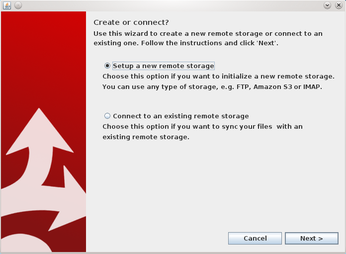Compile and Run Syncany on Ubuntu 11.04

Productivity Sauce
Syncany is a relatively young project, but it already garnered the attention of the open source crowd as a potential replacement for Dropbox. Syncany's major attraction is its support for a wide range of storage back-ends: from good old FTP, to Amazon S3, WebDAV, and even Picasa. Better yet, additional back-ends can be easily added via plugins.
While Syncany is far from ready for prime time, you can compile the current version of it from the source code to see for yourself what all this buzz is about.
First off, install the required packages using the following command (don't forget to enable Canonical Partners' repository in Synaptic first):
sudo apt-get install bzr sun-java6-jdk sun-java6-javadb ant libcommons-codec-java libcommons-cli-java libcommons-lang-java libcommons-collections3-java libcommons-logging-java libcommons-vfs-java libdom4j-java liblog4j1.2-java libjava-gnome-java libappframework-java libcommons-httpclient-java libj2ssh-java libcommons-net2-java
Next, you have to switch to Sun JRE as the default Java runtime environment. To do this, run the sudo update-alternatives --config java command and select the appropriate item. Fetch then Syncany's source code by running the bzr branch lp:syncany command. In the terminal, use the cd syncany/syncany command to switch to the syncany directory. Finally, build Syncany,and start the application using the following commands:
ant dist/bin/syncany.sh
If everything works properly, you should see Syncany's configuration wizard that guides you through the process of creating a synchronization profile. That's all there is to it.
comments powered by DisqusSubscribe to our Linux Newsletters
Find Linux and Open Source Jobs
Subscribe to our ADMIN Newsletters
Support Our Work
Linux Magazine content is made possible with support from readers like you. Please consider contributing when you’ve found an article to be beneficial.

News
-
Parrot OS Switches to KDE Plasma Desktop
Yet another distro is making the move to the KDE Plasma desktop.
-
TUXEDO Announces Gemini 17
TUXEDO Computers has released the fourth generation of its Gemini laptop with plenty of updates.
-
Two New Distros Adopt Enlightenment
MX Moksha and AV Linux 25 join ranks with Bodhi Linux and embrace the Enlightenment desktop.
-
Solus Linux 4.8 Removes Python 2
Solus Linux 4.8 has been released with the latest Linux kernel, updated desktops, and a key removal.
-
Zorin OS 18 Hits over a Million Downloads
If you doubt Linux isn't gaining popularity, you only have to look at Zorin OS's download numbers.
-
TUXEDO Computers Scraps Snapdragon X1E-Based Laptop
Due to issues with a Snapdragon CPU, TUXEDO Computers has cancelled its plans to release a laptop based on this elite hardware.
-
Debian Unleashes Debian Libre Live
Debian Libre Live keeps your machine free of proprietary software.
-
Valve Announces Pending Release of Steam Machine
Shout it to the heavens: Steam Machine, powered by Linux, is set to arrive in 2026.
-
Happy Birthday, ADMIN Magazine!
ADMIN is celebrating its 15th anniversary with issue #90.
-
Another Linux Malware Discovered
Russian hackers use Hyper-V to hide malware within Linux virtual machines.

